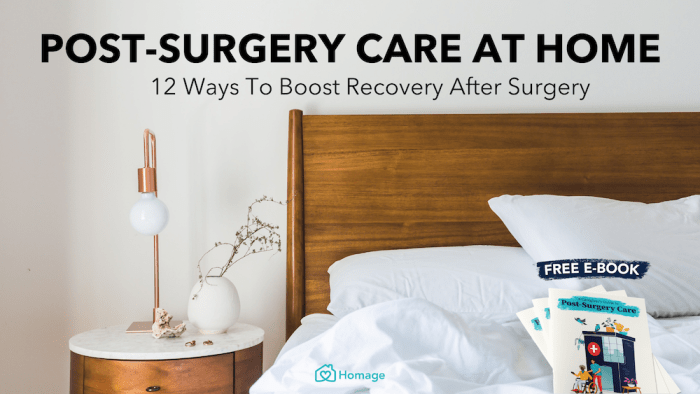
Post-surgery home care is a crucial aspect of recovery that often goes overlooked. It involves more than just resting; it encompasses a variety of supportive measures that can significantly enhance healing and well-being. From essential items to healthcare assistance, understanding the nuances of post-surgery care can make a world of difference in the recovery journey.
In this guide, we will delve into the basic components of post-surgery home care, explore various home health services available, discuss the importance of nutrition, and highlight safety precautions to ensure a smooth and effective recovery process.
Post-Surgery Home Care Basics
Post-surgery home care is crucial for a successful recovery. Proper care at home can significantly influence the healing process, preventing complications and ensuring a smoother transition back to daily activities. Understanding the essentials of post-surgery care can empower patients and their families to create a supportive environment for healing.
- Comfortable resting area: Ensure a quiet and comfortable spot for the patient to recuperate.
- Medication organizer: Keep medications organized and accessible to prevent missed doses.
- First aid supplies: Basic supplies like band-aids, antiseptic wipes, and gauze are essential.
- Health monitoring tools: Items like a blood pressure cuff and thermometer can help monitor recovery progress.
- Nutritional snacks: Stock up on easy-to-eat, nutritious snacks to support healing.
The Role of a Healthcare Assistant
A healthcare assistant can play a vital role in the recovery process post-surgery. They provide necessary support, assist with daily activities, and ensure that the patient adheres to their care plan. Having a dedicated individual to monitor health changes and assist with medication can ease the burden on family members while ensuring the patient’s needs are met in a timely manner.
Home Health Care Services
Home health care services offer a variety of options tailored specifically for post-surgery patients. These services are designed to provide professional care in the comfort of one’s home, allowing for a more personalized recovery experience.
- Nursing care: Registered nurses can assist with wound care, medication management, and health assessments.
- Physical therapy: Therapists help regain strength and mobility through targeted exercises.
- Occupational therapy: This service focuses on helping patients perform daily activities safely and effectively.
- Speech therapy: For those needing assistance with communication or swallowing after certain surgeries.
Choosing the Right Home Health Care Provider
Selecting a home health care provider involves careful consideration. Look for providers with positive reviews, proper certifications, and a clear understanding of the specific needs related to the surgery. It’s also beneficial to discuss expectations and care plans upfront to ensure alignment on post-operative goals.
Benefits of Home Health Care Services
Utilizing home health care services has numerous advantages for post-surgery recovery. Patients benefit from personalized care plans, increased convenience, and the comfort of home, all of which significantly contribute to a positive healing experience.
Healthy Food and Nutrition
Nutrition plays a fundamental role in the recovery process after surgery. A balanced diet can aid in healing, support immune function, and provide the energy needed for rehabilitation.
Healthy Food Options for Recovery
Incorporating a variety of nutrients into the diet can optimize recovery. Focus on foods rich in protein, vitamins, and minerals to promote healing.
- Lean meats and fish: Excellent sources of protein necessary for tissue repair.
- Fruits and vegetables: Packed with vitamins and antioxidants to enhance immune function.
- Whole grains: Provide energy and fiber to aid digestion.
- Nuts and seeds: Healthy fats that can support overall health and wellness.
Meal Plan for Post-Surgery Healing
A tailored meal plan can provide structure and ensure that nutritional needs are met during recovery. Here’s a sample meal plan for a typical recovery day:
| Meal | Menu |
|---|---|
| Breakfast | Oatmeal topped with fresh berries and a sprinkle of nuts |
| Lunch | Grilled chicken salad with mixed greens and vinaigrette |
| Dinner | Baked salmon with quinoa and steamed broccoli |
| Snacks | Greek yogurt and a piece of fruit |
Importance of Hydration
Staying hydrated is essential for recovery after surgery. Proper hydration aids in digestion, reduces fatigue, and helps maintain overall bodily functions. Encourage fluid intake through water, herbal teas, and broths, aiming for at least 8-10 glasses a day unless otherwise directed by a healthcare provider.
Managing Health Anxiety Post-Surgery
Health anxiety can be a common experience for patients after surgery. It is important to acknowledge these feelings and adopt strategies to cope effectively.
Common Health Anxieties
Many patients worry about complications, pain management, and their ability to return to normal activities. These concerns are valid but can be addressed through education and support.
Techniques for Managing Stress and Anxiety
Implementing relaxation techniques can help manage anxiety. Practices such as deep breathing exercises, meditation, and gentle yoga can promote mental well-being during recovery.
Importance of Mental Health Support
Mental health support is crucial during the recovery process. Engaging with a therapist, joining support groups, or simply reaching out to friends and family can provide emotional relief and allow patients to express their concerns.
Health and Fitness During Recovery
Maintaining physical activity is important for recovery, but it must be approached carefully depending on the type of surgery performed.
Post-Surgery Fitness Plan
Creating a fitness plan involves consulting with a healthcare provider to ensure exercises are safe and appropriate. Activities might include:
- Gentle walking: Promotes circulation and can be started shortly after surgery.
- Stretching: Helps maintain flexibility and reduces stiffness.
- Light resistance training: Can be introduced later as strength returns.
Gentle Exercises for Recovery
Gentle exercises such as walking, simple stretches, and specific rehabilitation exercises can aid in recovery. Always consult with a healthcare provider before starting any new exercise program to ensure safety.
Role of Physical Therapy
Physical therapy can be an effective component of post-surgery rehabilitation. Therapists provide tailored exercises aimed at restoring strength, flexibility, and functionality, aiding a quicker return to normal activities.
Safety Precautions at Home
Ensuring a safe home environment is imperative for patients recovering from surgery. Implementing safety measures can prevent accidents and promote independence.
Key Health and Safety Measures
A few critical safety measures include:
- Removing tripping hazards: Ensure walkways are clear of clutter and loose rugs.
- Installing grab bars: Add these in bathrooms and stairways for support.
- Using nonslip mats: Place these in the shower and kitchen to prevent slips.
Fall Prevention Strategies
Preventing falls is a significant concern for recovering patients. Strategies include encouraging the use of mobility aids, keeping frequently used items within reach, and ensuring good lighting throughout the home.
Safe Home Environment Checklist
Keeping an organized checklist can help maintain a safe living space. Regularly review and update the following:
| Checklist Item | Status |
|---|---|
| Clear walkways | ✔ |
| Install grab bars | ✔ |
| Check lighting | ✔ |
| Secure loose rugs | ✔ |
Health Clinics and Follow-up Care
Follow-up appointments post-surgery are vital for monitoring recovery and addressing any complications that may arise.
Importance of Follow-up Appointments
These appointments provide an opportunity for healthcare providers to assess healing, adjust medications, and answer any questions the patient may have about their recovery.
What to Expect During Post-Operative Visits

During follow-up visits, healthcare providers will typically check incision sites, evaluate overall health, and may conduct tests to ensure proper recovery.
Preparing for Follow-up Care Consultations
Patients should prepare for follow-up consultations by compiling a list of questions, noting any symptoms or concerns, and bringing a list of medications currently being taken to the appointment.
Health Equity and Access to Care
Health equity plays a significant role in the effectiveness of post-surgery care. Addressing disparities in healthcare access can improve recovery outcomes for underserved communities.
Impact of Health Equity on Post-Surgery Care
Understanding the impact of health equity is essential for improving care standards. Patients from underserved backgrounds may face barriers that affect their recovery and overall health.
Barriers to Adequate Home Care
Factors such as financial constraints, lack of transportation, and limited access to healthcare resources can impede recovery for some patients. Identifying these barriers is the first step in overcoming them.
Advocating for Better Health Services
Advocacy for improved health services can help address these disparities. Community outreach programs, improved funding for healthcare facilities, and increased awareness can make a significant difference.
Health Education for Patients
Providing health education is crucial for empowering patients during their recovery journey. Informed patients are better equipped to manage their care.
Health Education Materials for Patients
Patients should have access to clear and comprehensive health education materials. This includes information about medications, recovery expectations, and lifestyle changes to support healing.
Role of Family Members in Supporting Health Education
Family members can play a vital role in supporting health education by encouraging discussions about recovery, helping to manage medications, and providing emotional support throughout the healing process.
Access to Reliable Health Information
Patients should be directed towards reputable resources for health information. Sources like healthcare providers, established medical websites, and local health departments can provide valuable insights.
Health Benefits Insurance Coverage
Understanding health insurance coverage for post-surgery care is essential for managing costs and ensuring appropriate care.
Importance of Understanding Insurance Coverage
Patients need to be well-informed about their insurance plans to understand what services are covered during recovery. This knowledge can help avoid unexpected expenses.
Common Health Benefits Covering Home Care Services
Many health insurance plans cover home health care services, including nursing care, therapy sessions, and medical equipment rentals. Patients should review their policy details and consult with their insurance providers for specific coverage options.
Navigating Insurance Claims for Home Health Care
Navigating insurance claims can be complex, but understanding the process can facilitate smoother reimbursements. It’s helpful to keep meticulous records of all communications with healthcare providers and insurance companies.
Integrating Health and Social Care
Integrating health and social care can provide comprehensive support for post-surgery patients. This approach ensures that all aspects of a patient’s well-being are considered during recovery.
Benefits of Integrating Health and Social Care
Coordinated care between health providers and social services can enhance recovery outcomes. A holistic approach addresses not only physical health but also psychological and social needs.
Strategies for Coordinating Care
Effective communication among different healthcare providers is key to successful integration. Utilizing shared electronic health records and regular interdisciplinary meetings can facilitate better patient care.
Community Resources for Post-Surgery Recovery
Identifying community resources can aid in recovery. Many local organizations offer services such as transportation, meal delivery, and support groups, all of which can be beneficial for post-surgery patients.
End of Discussion

To wrap it up, post-surgery home care plays a vital role in the healing process. By being proactive about your recovery environment, seeking the right assistance, and maintaining a healthy lifestyle, you can pave the way for a faster, smoother return to your routine. Remember, your health and comfort should always be a priority, so take the time to invest in your recovery.
FAQ Summary
What are the key items I need for post-surgery care?
Essential items include pain relievers, wound care supplies, a comfortable place to rest, and nutritious food options.
How can I choose the right home health care provider?
Look for licensed providers with good reviews, specialized experience in post-surgery care, and a clear communication style.
What should I eat after surgery for optimal recovery?
Focus on high-protein foods, fruits, vegetables, and plenty of fluids to aid in healing and hydration.
Are there specific exercises I should do post-surgery?
Gentle stretching and walking are typically recommended, but consult your healthcare provider for personalized guidance.
How do I manage anxiety related to my recovery?
Engaging in relaxation techniques like deep breathing, mindfulness, and discussing concerns with a healthcare professional can help ease anxiety.





